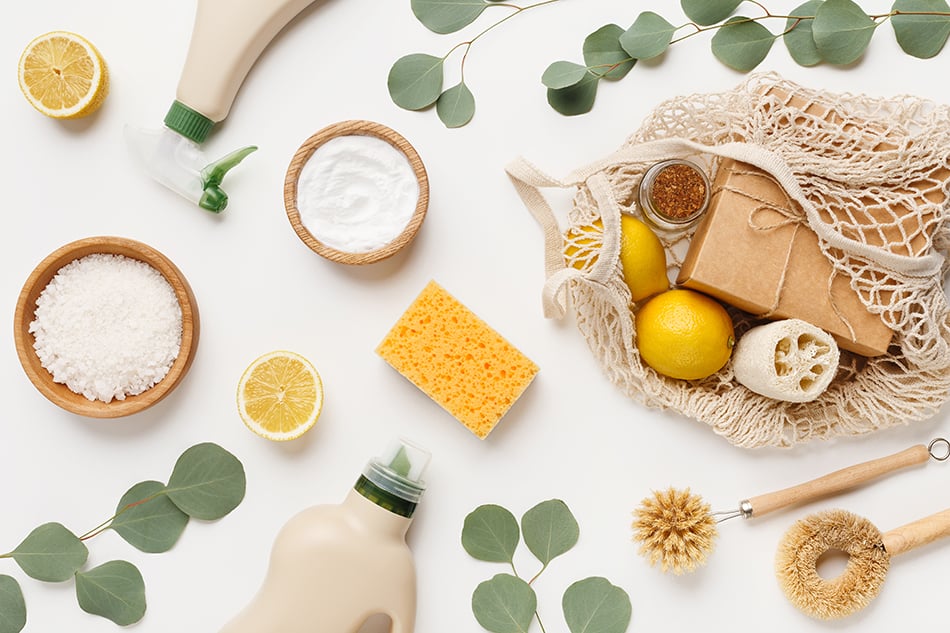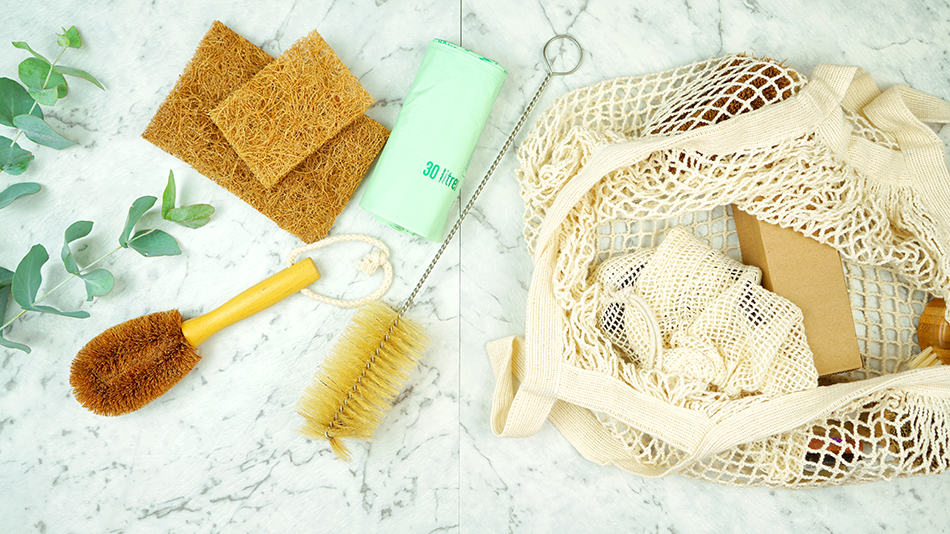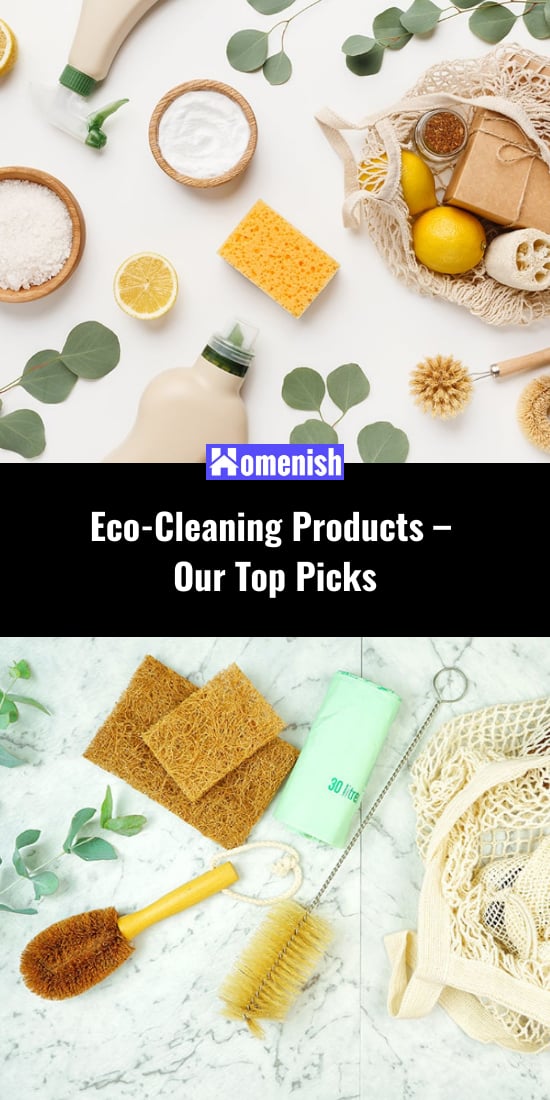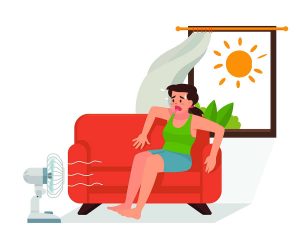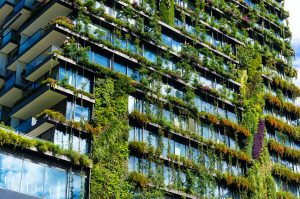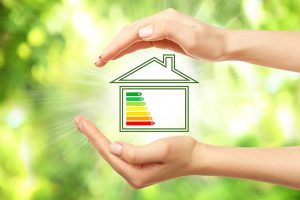Since the times of the industrial-chemical boom of the 1950s, when all chemicals were regarded as beneficial, we have come a long way in understanding how even everyday household cleaning products can adversely affect our environment and our health.
We now know that many classic household cleaning agents are full of compounds that are toxic, carcinogenic, mutagenic, and very bad for our shared environment. Along with other volatile compounds, aggressive cleaning products are responsible for poor indoor air quality, leading to various health issues.
Another significant environmental issue with household chemicals is packaging. Unlike the old times, when people were buying soaps in cardboard boxes, single use-plastic packaging, and household products’ diversification contributed to all their packaging becoming a substantial part of plastic pollution.
As a reaction to this dangerous trend, many companies, large and small, have started to rethink their products and churn out eco-cleaning products – innovative cleaning solutions that are much less harmful to our environment and health.
So what makes an eco-cleaning product? Let’s find out.
What Are Eco-Cleaning Products?
Although their concepts and designs can vary significantly, all eco-cleaning products share several common features.
- They are non-toxic.
- They are biodegradable, meaning they will efficiently break down into simple, non-harmful compounds once they end up in the natural environment.
- Preferably, they are made from natural and organic ingredients.
- They come in minimal packaging, which is made from recycled materials and can be recycled again.
- Cruelty-free products (not tested on animals) are also highly-regarded among eco-product customers.
Some eco-cleaning products look like the more typical lines of cleaning products in terms of product range and the packaging they use – it’s the quality of ingredients and materials that make all the difference.
However, other companies are trying to rethink the whole concept of home-cleaning products, making their products in unorthodox (usually very minimal) packaging or basing their supply on refills. The form of these products may also be different. Because less waste is one of the ultimate goals for this group of producers, they usually go under the flag of “zero-waste cleaning products.”
Last but not least, cleaning tools can also be labeled environmentally-friendly (or non-friendly). Cleaning tools that are fully biodegradable and made from natural materials, and/or are long-lasting is the broadest way to define them. We can make further distinctions based on the materials, their lifecycle, and the impact on the environment.
Let’s check out some of the best cleaning products in each of these categories.
Zero-Waste and Low-Waste Eco Cleaning Products
Packaging may not be the most obvious requirement for an eco-cleaning product. If it’s chemical composition is favorable, why should it matter what its packaging would be?
In the case you’ve overslept the past couple of decades, Earth is choking in plastic pollution. Most plastic pollution washing up on the world’s most beautiful beaches and choking waterways worldwide comes from single-use packaging.
Unfortunately, not all plastic packaging can be recycled – or the recycling doesn’t pay off. That is why all eco-friendly products should strive to reduce or avoid plastic in their packaging altogether.
Earth Hero Product Selection
Earth Hero is a large online marketplace that offers a careful selection of products and brands that make the cutting edge of modern environmentally-friendly products – including home cleaning products.
Earth Hero cleaning product selection is a perfect case study to comprehend what ideal zero-waste cleaning products look like. Most of them are made from natural organic materials, cruelty-free, and zero-waste, coming with a bare minimum packaging.
Earth Hero itself makes sure that products and brands they sell are “sourced, manufactured, and shipped in a way that protects our planet’s future.”
Here are some interesting examples from the store’s cleaning products selection.
Meliora’s Organic Castile Dish Soap
Castile dish soap is an ancestor of our common liquid dish detergent. Solid soap bars contain less synthetic chemicals and harmful ingredients than liquid soaps, so it is easy to see that they make a more eco-friendly choice for everything. Additionally, this particular Meliora’s Organic Castile Dish Soap is made from organic coconut and sunflower oil and comes plastic-free. Castile soap is concentrated, so it will last several times longer than your regular bottle of liquid dish soap. When you consider that aspect, the price will not seem that high as it might initially.
The soap is applied by rubbing a wet sponge or dish brush. The cleaning tool will get soapy effortlessly, and the soap is easy to rinse.
Earthy Edith’s Natural Carpet Cleaning Powder
A natural solution intended to lessen the need for carpet cleaning devices and professional carpet chemical cleaning, Earthy Edith’s Natural Carpet Cleaning Powder neutralizes bad odors and refreshes your carpet, plus removes grease and grime. It is basically a dry carpet shampoo based on natural ingredients such as baking soda and organic essential oils.
Natural Carpet Cleaning Powder comes either in a reusable stainless steel dispenser or as a refill with minimum packaging. On top of it all, Earthy Edith claims to be a zero-waste factory.
Meliora’s Natural All-Purpose Home Cleaning Spray
This product from Meliora is a perfect example of how the new zero waste manufacturers are revolutionizing the cleaning product market. It is designed to be a cleaning spray concentrate, which means it comes in the cardboard box in the form of flakes or pre-made tablets (you can choose) that you dissolve on your own – understandably in a reusable, and preferably glass – spray bottle.
The solution works for floors, walls, countertops, and pretty much all surfaces in your home. Meliora’s All-Purpose Home Cleaning Spray is non-toxic and made from natural ingredients.
Meliora’s Gentle Home Cleaning Soft Scrub
Meliora’s Gentle Home Cleaning Soft Scrub is a substitute for classic abrasive powder scrubs that may contain harmful chemicals. Instead, this product is based on low-impact ingredients such as baking soda. Although it is gentle because it doesn’t damage surfaces, it is a powerful cleaning agent for stainless steel, ceramic, porcelain, and most stovetop materials. That means it covers all the surfaces in the kitchen and the bathroom, which get oily or grime-covered.
It is used in the same way as classic abrasive scrubs – sprinkle it on a surface and scrub it with a rag or a sponge. Either the surface or the sponge needs to be wet.
Veles All-Purpose Cleaner
Veles is an all-purpose cleaner with the most unique – and best – development story on our list. It is derived from food waste (97%), with most of it coming from Google’s office in Manhattan. This may sound less strange if you consider that various kinds of vinegar and alcohol can be derived from exactly that – food waste. And indeed, the main active ingredients of Veles are alcohol, acetic acid, and lactic acids, coupled with essential oils and fragrance stabilizer to ensure a fresh fragrance in your household.
Veles manufacturing process is a closed-loop type and resource-negative. The product also comes in refillable and recyclable aluminum bottles (aluminum has a much better recycling rate than plastic).
A little spoiler: “Veles” is an old Slavic god of beasts and nature. While naming a house cleaner after a pagan god may be a bit pretentious, it shows the company’s faith in their product – transcending the desired shift towards nature.
Conventional Eco Cleaning Products
To me, zero and low-waste cleaning products listed above are genius inventions. But let’s face it – humans are creatures of habit. Many consumers (especially older ones) will be very reluctant to try radically different products than those they have been using for years, perhaps decades.
That is why eco-cleaning products that look more conventional on the outside are important. They are a gateway to a world of sustainability, a beginner step in getting less aware consumers to make their habits more environmentally-friendly.
Here are two renowned European companies with a vast array of products which, although not perfect in terms of packaging waste, go a long way
Le Briochin – Black Soap and others
Before cleaning products diversified with the chemical industry boom, one object was pretty much the one and only cleaning staple – it was a soap.
French family-owned company Le Briochin uses natural ingredients and traditional formulas. Their trademark products are based on efficient, quality natural soaps, which come in one solid piece, flakes, or in liquid form. Their most notable product is Savon Noir – “the black soap,” made from linseed in a traditional manner.
Although Briochin doesn’t go very much into specifics about the ingredients or their environmental impact, you still won’t find aggressive artificial dyes, smells, and other chemicals in Briochin products.
Le Briochin is an ideal brand for you if you still prefer to have your chemicals in a more typical range of products and packaging, plus if you find the rustic chic of a 20th-century European family-owned manufacturer appealing.
Le Briochin partially practices the zero and low-waste concepts you have seen with the zero-waste cleaning products. Instead of buying one product for each use in the home – the logic pushed by the classic home cleaning industry – you can buy two or more Briochin products and get a new formula for a specific use. For example, when you mix their liquid Black Soap and their Baking soda in warm water, you get a highly efficient kitchen surfaces cleaner. This reduces the amount of both packaging and chemical pollution.
Le Briochin also offers a personal care line of products.
Pros: Natural ingredients, Simplicity, ability to mix various products to get new formulas
Cons: The company doesn’t go into too much detail about the environmental impact of their products; classic plastic packaging (although there are refills available for some products).
Frosch
Frosch (German: ‘Frog’) is the country’s best-known brand of environmentally friendly house cleaning products. In tune with the name, Frosch products are very friendly towards aquatic ecosystems – the unfortunate end recipients of our wastewater.
Frosch’s active substances are plant- or mineral-based and biodegradable. Unlike Le Briochin with their universal soaps, however, Frosch offers a classic range of each-to-their-own products in plastic, but recyclable and mostly recycled packaging. Products are efficient but mild in terms of their impact on the environment and health. The company’s philosophy is: ‘good for humans, animals, and the environment.’
As for the packaging, the company states that it designs the packaging “in such a way that it can be kept in a closed-loop for recycled materials,” through, for example, striving to use plastic nanomaterials (single type of plastic). Their plastic is 100% recyclable and nearly 100% derived from recycled plastic.
Frosch also sources their ingredients as locally as possible, lessening their emissions when it comes to transportation.
Website:
Cleaning Tools – Cloths, Sponges, Brushes
No matter how good is your chemical cleaning agent, if you don’t have proper tools to spread it and scrub it – chances are you are not going to achieve the best result.
Typical sponges are not environmentally friendly. The most common ones are made from non-biodegradable plastic foam. Because their tiny holes make an ideal breeding ground for bacteria, we need to replace them often. Ironically, something that could last for hundreds of years due to material durability (plastic) needs to be replaced weekly or bi-weekly.
Swedish Dishcloth by Three Bluebirds
The Three Bluebirds is a company that has introduced the old invention called Swedish dishcloth into the United States.
Swedish dishcloths are highly durable, ribbed cloths made for dishwashing (but can be used for other purposes as well). The specific structure makes them efficient cleaners that are not prone to getting moldy. The Three Bluebirds Swedish Dishcloths are made from 70% wood cellulose from sustainably harvested wood and 30% organic cotton, certified not to contain any harmful chemicals.
To make dishwashing more fun, Three Bluebirds dishcloths have various cheerful prints in water-based ink.
Loofah or Lufa Sponges
Most talk on sustainable scrubbing utensils is how to make an environmentally-friendly sponge.
But did you know you can actually grow a sponge that is fully compostable and biodegradable?
Meet the Loofah squash, the fruit of the squash species Luffa aegyptiaca, or Luffa acutangula. Early in development, the fruit is edible; however, when fully ripe, it becomes too fibrous and rough to eat – but perfect for dishwashing!
Some people cook loofahs slightly prior to use, and some simply soak them and wait a bit until they go soft enough to squeeze and drain. If kept dry when not washing, one loofah can last a surprisingly long time – for months – without going rotten or moldy. When the sponge has been wasted away, just throw it into the compost heap.
Clean Planetware’s Heirloom Mayan Loofah Scrubbers are grown by one Mayan family in Guatemala – unprocessed and chemical-free.
Why I Don’t Recommend Wooden Dish Brushes
Amazon is full of wooden dish brushes based on traditional Japanese dish brushes. If you want to avoid plastic, they are a viable option, although I have some reservations.
First of all, frequent washing and lingering in moist areas will eventually wear out the wood and make it go moldy or smelly (due to bacteria) – and it is very difficult to disinfect it properly. That will make you replace your brushes probably more often than you imagined. While wood is a renewable natural resource, we face an unprecedented attack on our forests because of lumber exploitation, and as in the case of biomass, eco-alternatives to wood are highly desirable.
Bamboo brushes are another option, but again, the bamboo industry faces similar challenges in terms of impact on native ecosystems.
For the reasons listed above, personally, I would always rather opt for a Loofah sponge or a quality dishcloth than a wooden brush
Laundry
Classic laundry detergents are environmentally problematic from at least two aspects – chemical pollution of our waterways (especially by phosphorus which, as a plant nutrient, increases algal blooms, including the toxic ones), and plastic pollution from the containers they come in.
Fortunately, there are alternatives.
Eco Egg
Eco Egg is a compact egg-shaped capsule with natural mineral pellets inside. These pellets are the “secret ingredient” that washes your clothes instead of a detergent. In tune with low and zero-waste principles, the egg is refillable, and it is made from recyclable plastic if you ever need to replace it.
The egg goes inside the washing machine drum with the laundry. Different capacities are available, from 40 washes to 210 washes, with 70 washes being the most commonly sought-after size. 70 washes with the Eco Egg saves you 40 plastic bottles from traditional detergent.
The Eco Egg replaces both the detergent and the fabric conditioner.
You may be a bit reserved about the Eco Eggs efficiency as it looks a bit eccentric. If you don’t trust web reviews, Good Housekeeping magazine tested the Eco Egg and found that it can wash more than 90% of nasty stains such as blood and sebum from cotton laundry, while it is a bit less efficient when it comes to synthetic materials – in that case, 67% of stains were removed.
Another perk of this product is that it is hypoallergenic. If you have sensitive skin irritated by regular detergents, that’s another potential reason for trying out the egg.
TruEarth Laundry Strips
Rather than making a powder, TruEarth’s idea is to make laundry detergent in the form of highly concentrated strips that dissolve in the washer fully. That makes it easy to pack into small paper bags rather than big bulky plastic or cardboard bags and boxes. Genius, right?
Most importantly, the detergent is biodegradable, lacks aggressive or environmentally harmful chemicals such as parabens, phosphates, added dyes, chlorine bleach, and 1,4-dioxane. That also makes it a certified hypoallergenic detergent. It is also cruelty-free and vegan, made without animal ingredients or animal testing.
Laundry detergent in strip form also takes up much less space than a standard one. While this is not an advantage only in your home where it will save quite a lot of space, it also decreases the product’s transportation footprint since the packages are much lighter, smaller, and therefore easier to ship.
TruEarth Strip Laundry Detergent is produced in Canada.
DIY Cleaning Products
In the case your favorite eco-cleaning products run out, I have good news for you. Common household items can be used for cleaning your living space and with great results. Whether you are aware of it or not, in your kitchen, you are surrounded by chemical compounds – some of which make excellent cleaning agents.
- Baking Soda– ultimate abrasive scrub and nasty smell absorber.
- Vinegar– Ultimate degreaser.
- Lemon juice– degreaser plus freshener.
- Horse Chestnut Liquid Soap– light DIY liquid detergent suitable for surfaces and even laundry which is not too dirty.
You can add a few drops of essential oil of your choosing to add a refreshing note to these homemade cleaning chemicals.
Conclusion
For decades we have put dangerous chemicals in – and all over – our homes, in blissful ignorance of their harmful effects on our health and on our environment.
Now that we have enough evidence of how damaging house cleaning chemicals are to our waterways, our indoor air quality, our bodies, and the animals that these products are tested on, it is time for a change. Is your house truly clean if you have laden it with dangerous chemicals?
Fortunately, the offer of eco-cleaning products has increased and diversified so much that there is virtually no need to intoxicate yourself and your environment to keep your home clean, fresh, and sparkly. I have tried my best to introduce you to the basic concepts of eco-cleaning products, low-waste cleaning products, and zero-waste products, highlighting some shiny examples of these categories.
Do you use any eco-cleaning products in your household? Do you prefer zero-waste or a classic approach? Please leave a recommendation for your favorite product in the comments!
